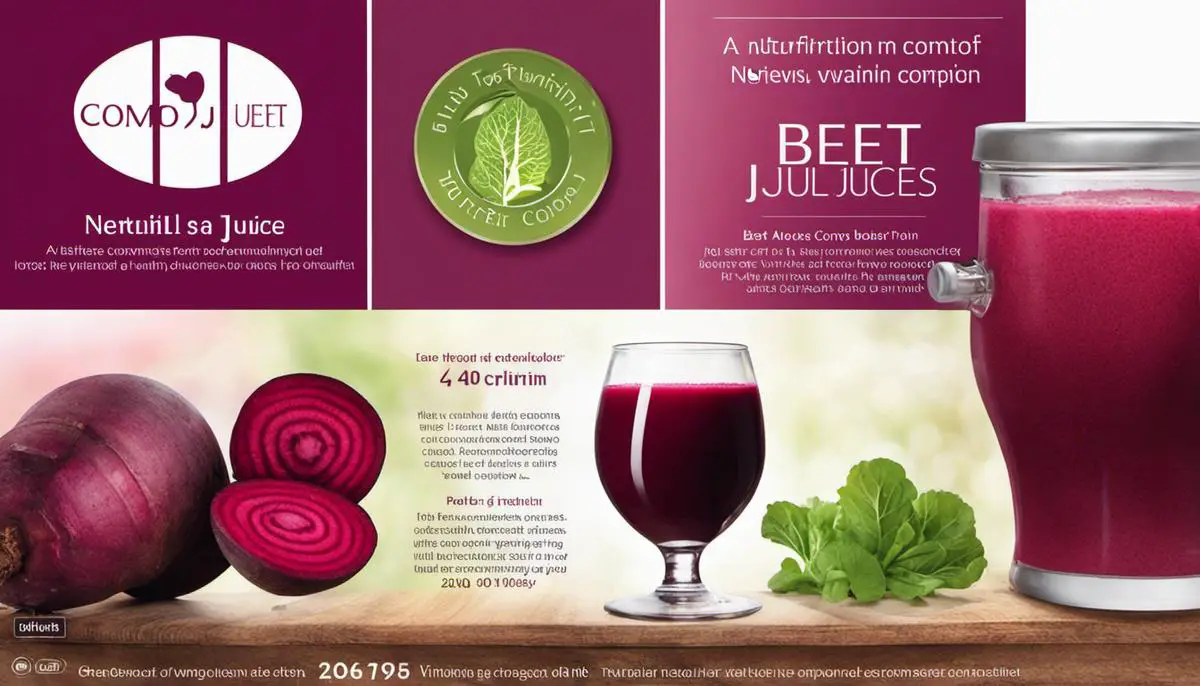Beet juice is nature’s ruby elixir, providing a plethora of health benefits while acting as a powerhouse of vitamins, minerals, and other essential nutrients. Drinking beet juice is easy to incorporate into a healthy diet, and the advantages it offers range from enhancing athletic performance to contributing to cardiovascular and liver health. This article will shed light on the nutritional profile of beet juice, zooming in on the roles nitrates and other compounds found in beet juice play in maintaining and improving our health. Whether you’re already a fan of this vegetation’s viridescent sibling or are simply keen about exploring new ways to optimize your health, this deep dive into the nutritional worth and health benefits of beet juice is for you.
Nutritional Value of Beet Juice
Nutritional Profile of Beet Juice
Beet juice is a nutritional powerhouse packed with essential vitamins, minerals, and bioactive compounds. Per 100 grams, the juice contains approximately 22 calories, 0.2 grams of fat, 1.6 grams of protein, 5 grams of carbohydrates, and 0.2 grams of dietary fibre. It is virtually devoid of fat, thus rendering it a healthy beverage option.
Vitamins and Minerals in Beet Juice
Among its many nutrients, beet juice is a good source of Vitamin C, folate (B9), and potassium. Vitamin C plays a vital role in supporting a robust immune system and maintaining the health of our skin and tissues. Folate is essential for cognitive function, heart health, and red blood cell production. Beet juice also contains trace amounts of other vital minerals like calcium, iron, magnesium, phosphorus, sodium, and zinc.
Phytonutrients in Beet Juice
Beet juice is rich in phytonutrients, including betalains, which give beets their vibrant color and possess strong antioxidant, anti-inflammatory, and detoxification properties. The juice also contains nitrates, which are converted into nitric oxide in the body, promoting blood flow and potentially lowering blood pressure.
Comparison with Other Juices
Compared to other popular juices, beet juice stands out for its nutrient density. Many commonly consumed juices such as orange juice or apple juice have more calories and sugar per serving. Beet juice also surpasses many other juices in its high folate and potassium content. Conversely, orange juice has more vitamin C per serving, while spinach and carrot juices contain more vitamin A.
Health Benefits of Beet Juice
Beet juice’s nutritional composition contributes to its several health benefits. Its high nitrate content can aid in lowering blood pressure, improving heart health, and boosting physical performance by enhancing blood circulation and oxygen flow to muscles. The antioxidants present can help neutralize harmful free radicals in the body, reducing the risk of chronic diseases such as cancer and heart disease.
The folate in beet juice supports mental health and cognitive function, potentially reducing the risk of mental and neurological conditions like dementia. Moreover, beet juice’s high fiber content aids in digestion and weight management, as it promotes feelings of fullness and supports a healthy gut.
Without a doubt, the extensive list of nutrients and the numerous potential health benefits position beet juice as an advantageous addition to any well-rounded diet. Nevertheless, to limit excessive sugar intake, beet juice should be consumed with care, serving as a part of a diverse, balanced diet and an overall healthy lifestyle.
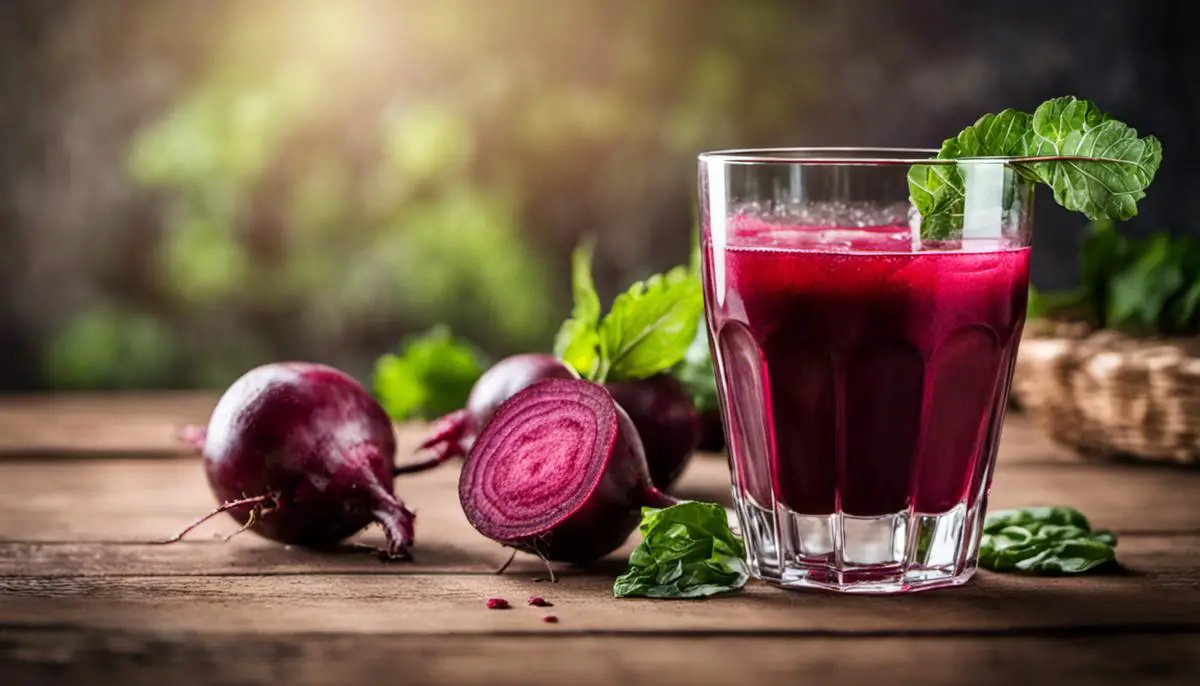
Beet Juice and Cardiovascular Health
Promoting Cardiovascular Health with Beet Juice
Beet juice is quickly gaining recognition as a powerful natural remedy for enhancing cardiovascular health. Numerous studies suggest that regular consumption may contribute to improved heart function and reduced blood pressure. A significant aspect of these benefits from beet juice is its rich nitrate content, a naturally present compound that our bodies convert into nitric oxide.
Importance of Nitrates in Beet Juice
Dietary nitrates, like those found in beet juice, are a powerful nutritional tool for managing blood pressure. Nitrates help to relax and dilate blood vessels, improving blood flow throughout the body. This is particularly beneficial for the heart, as improved circulation means the heart doesn’t have to work as hard to pump blood, improving cardiovascular function and reducing risks of heart disease.
A 2015 study published in the Journal of Hypertension found that participants who drank beet juice saw a significant reduction in blood pressure, attributable to the juice’s high nitrate content. Similarly, a 2012 study in the American Journal of Clinical Nutrition also reported that consuming beet juice led to lower blood pressure and improved endothelial function, a marker of cardiovascular health.
Beet Juice and Heart Disease Risk
Beyond blood pressure regulation, the overwhelming nitrate content in beet juice also has a protective role in heart health. Specifically, by increasing the production of nitric oxide, a signal molecule that widens and relaxes the blood vessels, it enhances blood distribution to all organs and tissues.
Nitric oxide plays a crucial role in maintaining the elasticity of blood vessels, which can reduce the possibility of developing atherosclerosis, a situation characterized by the hardening of the arteries that often predates heart disease. Furthermore, nitric oxide improves platelet function, reducing the likelihood of clots that can cause heart attacks and strokes.
The American Journal of Clinical Nutrition published a study in 2013 suggesting that dietary nitrate, like that found in beet juice, was connected with a lower risk of dying from heart disease. Another study in the European Journal of Nutrition in 2016 concluded that long-term intake of dietary nitrate was linked to a lower risk of death from heart disease.
Improving Circulation with Beet Juice
The nitrate-to-nitric oxide conversion facilitated by beet juice consumption provides an additional benefit—enhanced circulation. Greater blood flow ensures that your organs, including the heart, receive necessary oxygen and nutrients while facilitating the removal of waste by-products.
According to a 2017 study published in the Journal of Gerontology, regular intake of beet juice may improve the function of cells lining blood vessels (endothelial cells) and increase blood flow to the brain, underscoring the juice’s potential to aid in overall circulation.
Consider this: beet juice, abundant in health-boosting nitrates, is a remarkably influential player in bolstering cardiovascular health. The regular consumption of this vibrant juice can help manage blood pressure levels effectively, lower the risk of heart disease, and promote better blood circulation—all of which contribute to a more robust and healthier heart. Thus, including beet juice in your diet can lead to significant gains in your heart health and overall wellness.
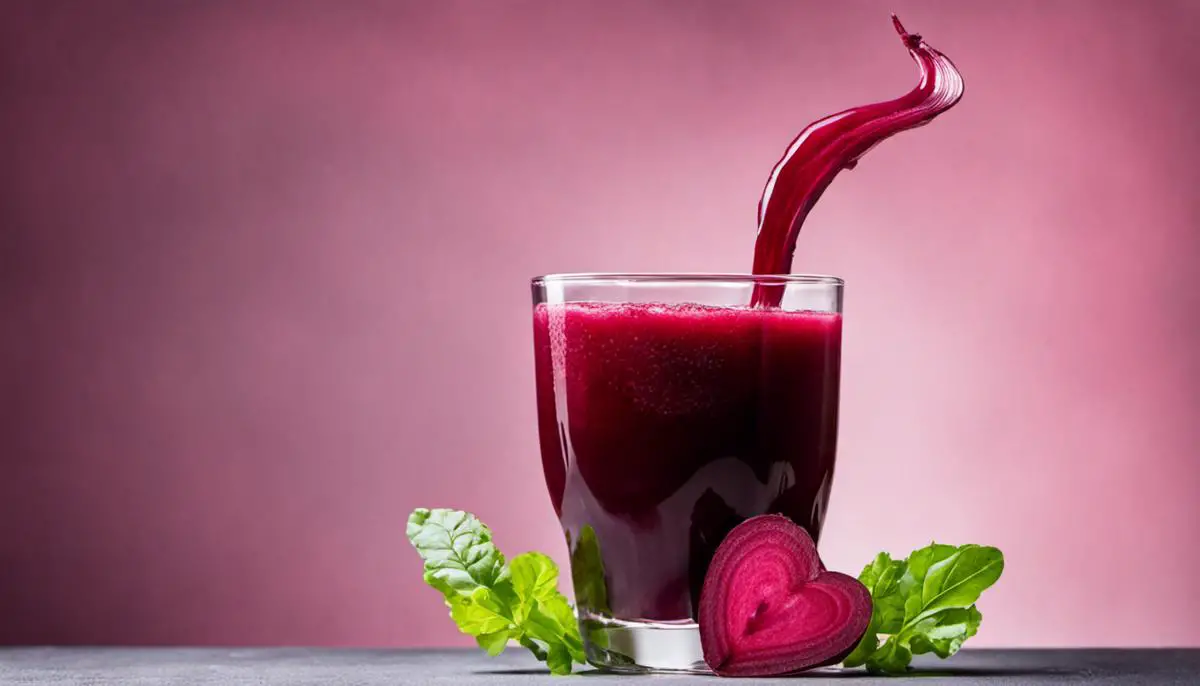
Beet Juice and Stamina
Boost Your Stamina with Beet Juice: A Natural Performance Enhancer
Could your sports drink be a bright red vegetable juice? For many athletes and fitness enthusiasts, beet juice has become the go-to choice for enhancing physical performance and endurance, all thanks to its high nitrate content. Naturally present in vegetables like beets, nitrates can have a profound impact on the body’s functions.
In particular, nitrates are known to rev up their engines in the mitochondria—the energy factories in our cells—that convert food’s energy into a form the cells can utilize. With beet juice acting as a nitrate-fuelled enhancer, your body’s energy production can receive a significant boost, leading to improved stamina, particularly for endurance exercises.
Once inside your body, the nitrates in beet juice transform into nitric oxide. What’s so special about nitric oxide? Well, it’s a vasodilator—it relaxes and widens the inner muscles of your blood vessels, boosting blood circulation. With increased circulation, oxygen and nutrients can more easily reach your muscles, thereby delaying fatigue during workouts and contributing to better overall performance.
In fact, one study has shown that cyclists consuming beet juice could pedal intensely for 16% longer compared to those who had a placebo. This suggests that beet juice can considerably amplify endurance and stamina during physical activities—a winning point for endurance athletes or anyone seeking to lengthen their workout sessions.
Besides its remarkable stamina-enhancing properties, beet juice, packed with antioxidants and other nutritious compounds, brings along a plethora of other health benefits. It has betalains—compounds linked to a reduced risk of heart disease and certain cancers. Plus, it’s packed with essential minerals, including potassium and magnesium, which function to ensure your muscles perform at their best.
While research continues to delve further into the benefits of beet juice, early results indicate that this vibrant juice could be one of the most effective natural performance-enhancing substances accessible today. Incorporating beet juice into your balanced diet might offer a simple yet tasty way to take your workout performance up a notch, or several.
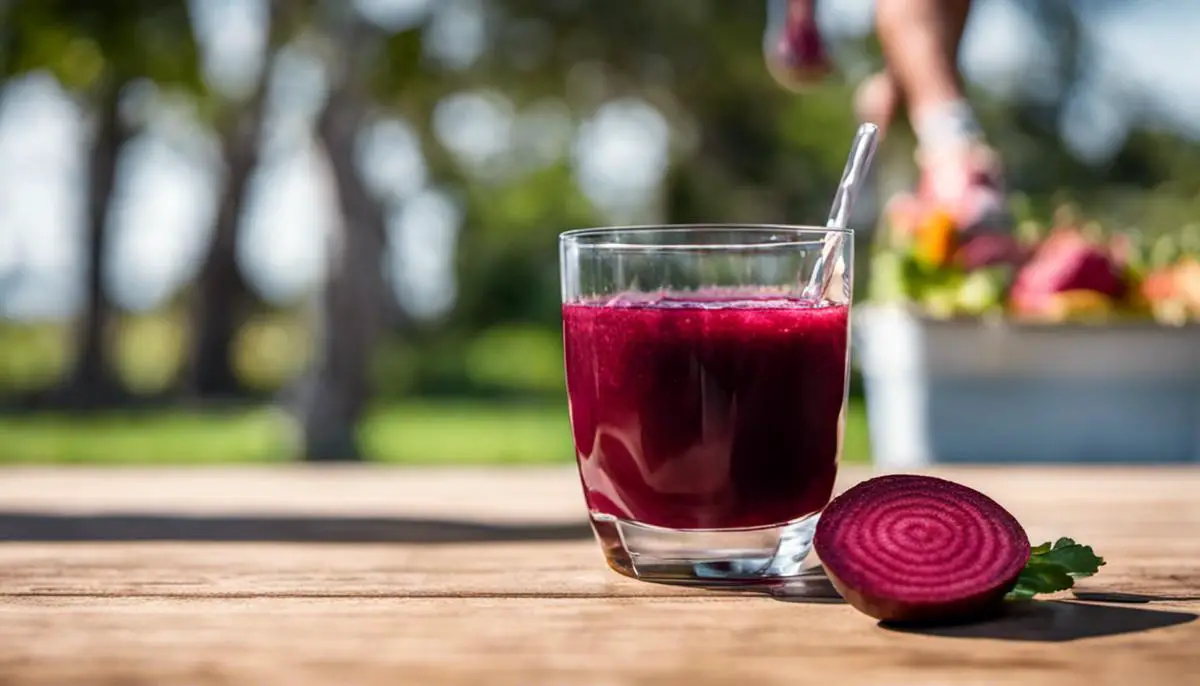
Beet Juice and Liver Health
Promote Liver Health with Beet Juice
Our liver is a vital organ that plays a significant role in detoxification, a process crucial to our health. One way to enhance liver health and improve digestion is the consumption of beet juice. The liver’s central role is to cleanse the blood coming from the digestive tract before it’s distributed to the rest of the body, and it also helps metabolize drugs and detoxify chemicals. Beet juice supports these functions.
Beet juice packs a nutritional punch, supplying the body with iron, potassium, fiber, folate, and betalains – antioxidants responsible for the vibrant red and purple hues in beets. Betalains have shown potential in decreasing oxidative stress, a critical factor contributing to the development of liver disease.
Role of Beet Juice in Detoxification
A major health benefit of beet juice lies in its ability to aid the liver in detoxification. Beets contain a phytonutrient called pectin, a soluble fiber that can assist in clearing the toxins that have been removed by the liver, ensuring they are fully flushed out of the system and not reabsorbed. This action prevents the buildup of toxins, promoting a healthier and more efficient liver.
Moreover, beet juice contains betaine, an important compound that aids liver function and helps to protect the liver and bile ducts. Betaine promotes the breakdown and removal of fat deposits in the liver, helping to prevent or reduce fatty liver disease.
Supporting Liver Function and Digestion
Beet juice also provides ample support to the overall liver function. It stimulates liver cells and protects the liver from excessive alcohol, chemicals, and other damaging substances.
Nutrients in beet juice increase bile flow, which aids digestion, particularly the digestion of fats. By enhancing the metabolism of fats, beet juice can contribute to the prevention of conditions like non-alcoholic fatty liver disease.
Moreover, beet juice promotes regular bowel movements due to its high fiber content, further aiding the digestive process. It keeps the digestive system healthy and reduces the risk of digestive disorders such as constipation, inflammatory bowel disease, and diverticulosis.
Beet Juice as a Beneficial Liver Tonic
Given the myriad of health benefits beet juice offers, it is particularly potent for improving liver function and digestion. Including beet juice in your regular diet could potentially enhance liver performance, boost digestive process, and contribute to overall health. Nevertheless, it is essential to maintain balance in its consumption to prevent potential side effects such as beeturia (pink urine), kidney stones, or upset stomach. Like all dietary changes, it remains wise to discuss these with a healthcare professional first. To summarize, beet juice is a superb dietary addition, primarily because of its positive impact on liver health.
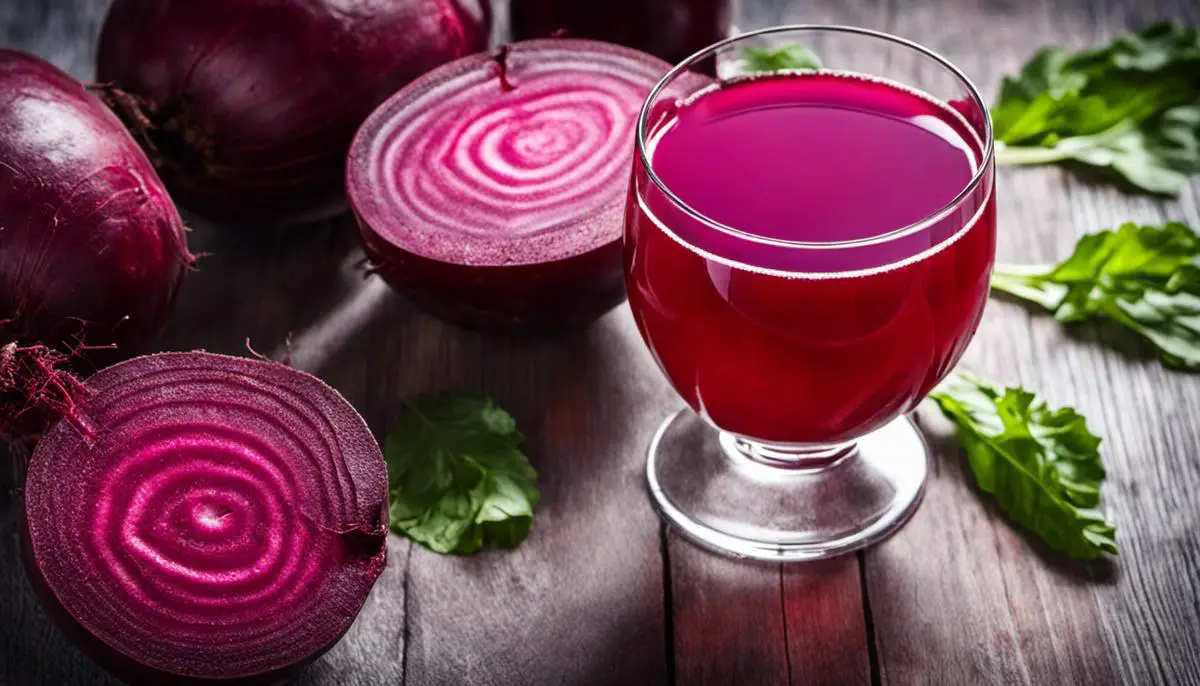
Potential Risks and Considerations
The Potential Risks of Beet Juice Consumption
Despite its health benefits, one must also be informed about potential risks and side effects linked with beet juice consumption. A notable risk stems from the high levels of oxalates in beets, prevalent in many plants and foods, which could potentially result in kidney stone development in certain individuals.
While this doesn’t mean that all will develop kidney stones, individuals with a history of the condition should be cautious with beet juice consumption or avoid it. Interestingly, cooking beets can reduce their oxalate content, providing an alternative way to incorporate this vegetable into your diet.
Moreover, beets are rich in nitrates, substances that inside the body, convert to nitric oxide. Nitric oxide can reduce blood pressure via blood vessel dilation but could pose risks for those taking blood pressure medication due to a possible drastic drop in blood pressure levels.
Consumption of beet juice could also lead to a benign condition known as beeturia, a condition marked by reddish urine or stools due to beet’s betacyanin pigments. Although this usually isn’t a medical concern, if beeturia comes with symptoms such as diarrhea, vomiting, or abdominal pain, medical assistance may be necessary as it might point to a more serious health issue.
Lastly, the sugar content of beet juice may raise eyebrows. High in natural sugars, excessive beet juice consumption could potentially lead to weight gain or impact blood sugar management in diabetic individuals. Therefore, those with diabetes or at risk should exercise caution with beet juice consumption and perhaps go for mixed juices that include low-sugar vegetables like cucumbers or celery.
While most people can safely take pleasure in beet juice advantages by incorporating it into a balanced diet in moderate quantities, individuals with particular health concerns or who are pregnant or nursing should first discuss with their healthcare provider before integrating beet juice consumption into their diet. The potential effects of the high nitrate content found in beet juice on unborn children and infants aren’t well understood.
In conclusion, personal health status, tolerability, and potential risks should be evaluated before integrating beet juice into your diet. Despite the fact that beet juice can promote heart health, increase stamina, and offer several essential nutrients, it isn’t a panacea and should be consumed with its potential risks and side effects in mind.

The discussion presented amplifies the value beet juice holds from a health perspective. It’s clear that the reinforcement of cardiovascular health, increased stamina, and improved liver function stand out as some of the key benefits. However, while beet juice is loaded with health benefits, it’s essential to consider potential risks and necessary precautions. Everybody’s body chemistry is unique; different people may respond differently to beet juice. Therefore, it is recommended to consume in moderation and listen to your body’s signals. It’s not about replacing medical therapies with beet juice, but integrating it as part of a balanced, health-aware lifestyle.
